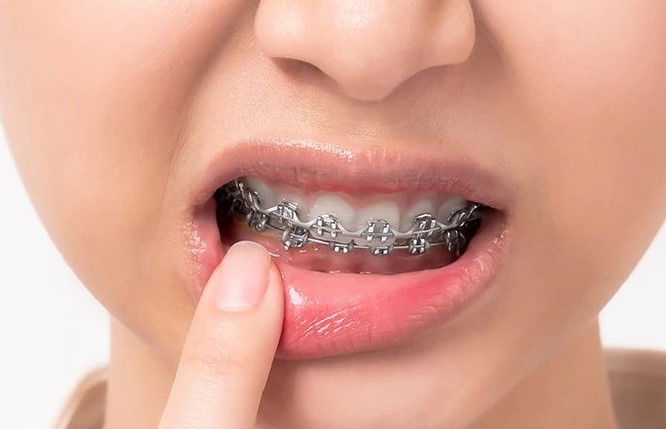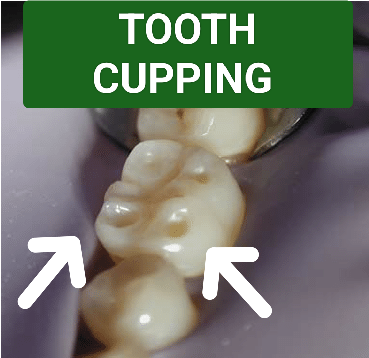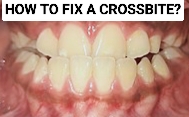Orthodontic braces are a common way to align misaligned teeth and improve your dental health. While braces can be effective in providing long-term benefits, they can also cause discomfort and pain during the initial stages of treatment.
A common symptom is tooth pain, which can occur for various reasons. However, there are ways to prevent tooth pain caused by orthodontic braces.

Why Do Tooth Pain after Using Orthodontic Braces?
When braces are first placed, they can cause some discomfort and pain as the teeth and jaw begin to adjust and move into their new position. This discomfort usually lasts for a few days to a week. In general, any pain or discomfort felt during braces treatment is due to the following reasons:
1. Pressure on Teeth
Orthodontic braces exert pressure on teeth, which forces them to move from their position. This pressure creates tension in the gums, resulting in pain and discomfort for the patient.
2. Sensitive Teeth
Orthodontic braces can make teeth more sensitive to pressure, causing them to ache. This is due to the thinning of the enamel, which makes teeth more vulnerable to pressure.
3. Braces Tightening
Braces need to be tightened at regular intervals to ensure the teeth are moving correctly. However, when the braces are tightened, patients may feel a significant amount of pain and discomfort in their teeth.
4. Slippery Wires
Braces wires can also slide or slip out of place occasionally. This can cause the wires to rub against the gums or teeth, resulting in pain and soreness.
How Does Pressure And Tension From Braces Cause Pain?
When orthodontic wires apply pressure and tension to the teeth, it can cause discomfort and pain. This is because the pressure and tension cause the ligaments around the teeth to stretch and shift. The ligaments are the flexible fibers that attach the teeth to the bone in the jaw. When the ligaments stretch and shift, it can cause soreness or a dull ache, which may be experienced as a continuous pressure or a throbbing sensation.
Additionally, the brackets and wires may also rub against the cheeks and tongue, causing sores and irritation. This can further contribute to pain and discomfort during orthodontic treatment.
The amount of discomfort experienced during orthodontic treatment will vary from person to person. Some people may experience only mild discomfort, while others may experience more severe pain. However, it is essential to remember that this discomfort is temporary and is a natural part of the orthodontic process. Over time, as the teeth adjust and move into their new positions, the pain and discomfort will subside.
Related Article :- What Are The Types Of Braces Used for Treating Malaligned Teeth?
How to Stop Teeth from Hurting from Braces?
The good news is that there are several ways to prevent tooth pain after using orthodontic braces:
1. Painkillers
Patients can take over-the-counter painkillers such as paracetamol or ibuprofen to alleviate tooth pain temporarily. However, be sure to follow the recommended dosage.
2. Soft Food
Eating soft food is advisable when teeth are hurting from braces. Avoiding hard or crunchy foods can reduce pressure on teeth and prevent further pain.
3. Wax
Braces wax can help to reduce soreness by creating a barrier between the braces and gums.
4. Oral Rinses
Rinsing with warm saltwater can help to reduce swelling and alleviate pain caused by braces. Antiseptic mouthwashes such as Corsodyl can also help to prevent infections.
5. Orthodontic Wax
Patients can apply orthodontic wax to the braces wires to prevent them from rubbing against the gums or teeth.
6. Cold Compress
A cold compress applied to the affected area can help to reduce swelling and relieve pain.
7. Mouthguard
Use an orthodontic mouthguard or silicone chewing device to alleviate discomfort caused by tension or pressure on the teeth and jaw.
8. Be patient
Tooth pain is a common side effect of braces, but it will usually subside within a few days to a week. If the pain persists or becomes severe, contact your orthodontist for further advice.
Conclusion
Tooth pain is a common symptom associated with braces. However, there are several ways to alleviate pain and prevent future discomfort. Patients must consult their orthodontist if they experience prolonged or severe pain. By following the precautionary guidelines given by the orthodontist, patients can enjoy the benefits of a healthier, happier smile without any discomfort.
Related Article :- What Are The Types Of Braces Used for Treating Malaligned Teeth?
FAQs
1. Is it normal to have tooth pain after braces are put on?
Yes, tooth pain is a common side effect when braces are first put on. The pressure that the brackets and wires put on the teeth can cause discomfort and soreness, especially when eating or biting down.
2. How long does the pain last?
The pain typically lasts for a few days to a week, but it can vary depending on the individual and the severity of the tooth movement. After an adjustment, there may also be some discomfort for a few days.
3. What can I do to alleviate the pain without medication?
You can apply an ice pack to the affected area, eat soft foods, and rinse with warm saltwater to reduce inflammation.
4. Can I still brush and floss my teeth with braces on?
Yes, it’s important to continue brushing and flossing regularly when you have braces. Your orthodontist can show you how to properly clean around the brackets and wires, and may recommend additional cleaning tools like a Waterpik or interdental brush.
5. What if the pain persists even after trying different remedies?
If the pain persists after a week or gets worse, contact your orthodontist. They may need to adjust your braces or provide additional treatment to alleviate the pain.
Related Article :- What Are The Types Of Braces Used for Treating Malaligned Teeth?




